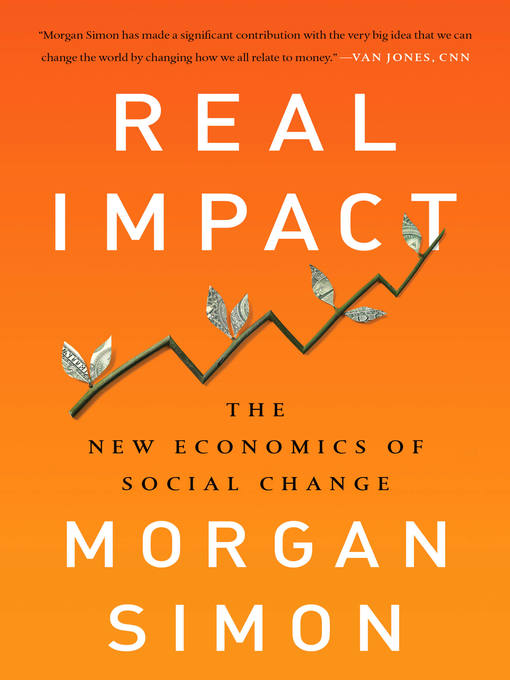
Real Impact
The New Economics of Social Change
- اطلاعات
- نقد و بررسی
- دیدگاه کاربران
نقد و بررسی

May 22, 2017
Simon, founder and chair of the nonprofit Transform Finance, opens this fast-paced, provoking book with a crash course in impact investing, “the trillion-dollar trend most people have never heard of.” As she explains, impact investment (the Rockefeller Foundation’s term) means investing for social benefit as well as profit. Simon starkly concludes that the current, well-intentioned “free-market-plus-charity model” hasn’t effected substantive change. According to a study cited here, only 12% of foundational giving goes to social-justice causes; the rest supports education and arts organizations that largely service the already wealthy or at least economically secure. Rather than raising relatively small amounts of money expressly for charity, impact investing seeks to leverage the much larger sums in the global economy by pressuring companies to do better with their money. Simon talks frankly and critically about established philanthropic practices, stressing that wealthy donors must not wholly control the process of dispersing funds. Her bracing, hard-hitting message for big business is accompanied by advice for middle-class investors, who are encouraged to move personal accounts from big banks to community banks and clean up their stock holdings. Clear-eyed, explicit, and tinged with just the right amount of outrage, this is a clarion call that the world of well-meaning social-justice activists needs to hear. Agent: Victoria Skurnick, Levine Greenberg Rostan.

August 15, 2017
Investment adviser Simon outlines the concept of impact investment, "the practice of investing not just for profit, but also for social benefit."In some ways, impact investment aligns with Bangladeshi financier Muhammad Yunus' experiments in microfinance and what he is now calling "social business," giving would-be entrepreneurs in developing countries opportunities to enter the marketplace. Simon holds that some of Yunus' programs, however, have not scaled well in the marketplace and may have worked backward; the first step, she suggests, is to "identify a good idea that has a mix of qualitative and quantitative, micro and macro approaches to addressing poverty and structural inequality"--and always with an eye to profitability. In her understanding of impact investment, a great deal of due diligence is involved to assure not only that investors' money is well placed in projects that do good in the world, but also that communities are well served. To this end, Simon offers a series of operating principles--e.g., the call to "add more value than you extract," again with an eye to such things as providing long-term, well-paying jobs to help break the cycle of poverty. Throughout, Simon insists on some of the basic tenets of capitalism, including the notion that the value added should yield return on investment. Even so, she counsels that investors take steps that, en masse, would shake Wall Street to the ground, such as the thought that the conscious impact investor should "break up with your bank" and look to community banks and other institutions that are better inclined to social justice. Simon also suggests that investors realign their portfolios so that they know, as the adage has it, where their money spends the night, investing in funds that provide small loans to entrepreneurs, funding for sustainable agriculture projects and water systems, and the like. A cleareyed case for socially conscious investment, of much interest to those who want their dollars to do good.
COPYRIGHT(2017) Kirkus Reviews, ALL RIGHTS RESERVED.

September 15, 2017
Impact investment is "selecting for-profit investments in light of...awareness of the social and environmental outcomes of such investments," writes Simon (coleader, Candide Group), who sees great potential for impact investment to foster positive, systemic economic change. This book is in part a warning to impact investors to avoid what the author regards as the failures and limitations of philanthropy, microfinance, and fair trade. Her critiques of these three methods are thought provoking, as is her argument that the nub of poverty is the lack of economic autonomy. The more distinctive, second part of the volume discusses practical ways to implement impact investment using three principles: "engage communities in design, governance, and ownership"; "add more value than you extract"; and "fairly balance risk and return between investors, entrepreneurs, and communities," followed by real-life examples of such implementation. One need not share Simon's progressive political sensibility to make use of the principles and tools she proposes. VERDICT Though at times emotional and needlessly autobiographical, this book's focused, practical aspects are insightful and informative and will appeal to those seeking realistic ways to alleviate poverty.--Shmuel Ben-Gad, Gelman Lib., George Washington Univ., Washington, DC
Copyright 2017 Library Journal, LLC Used with permission.




دیدگاه کاربران